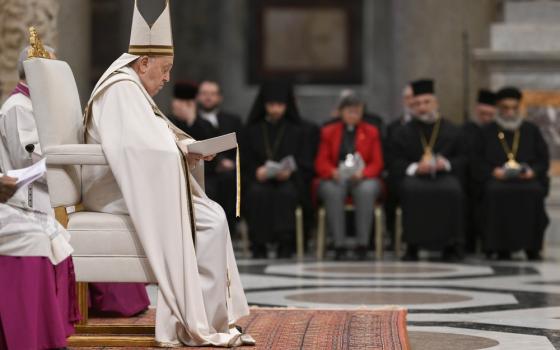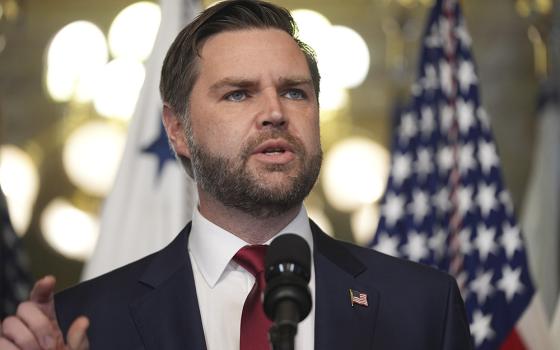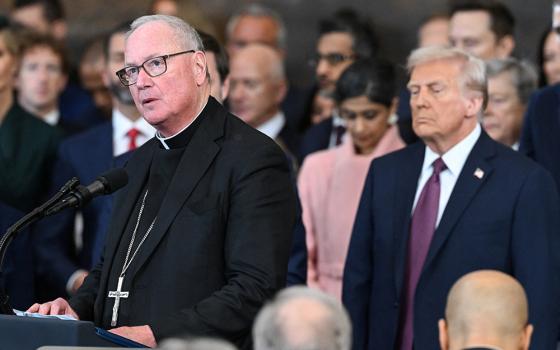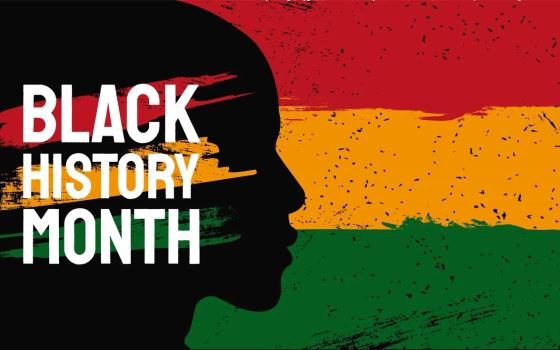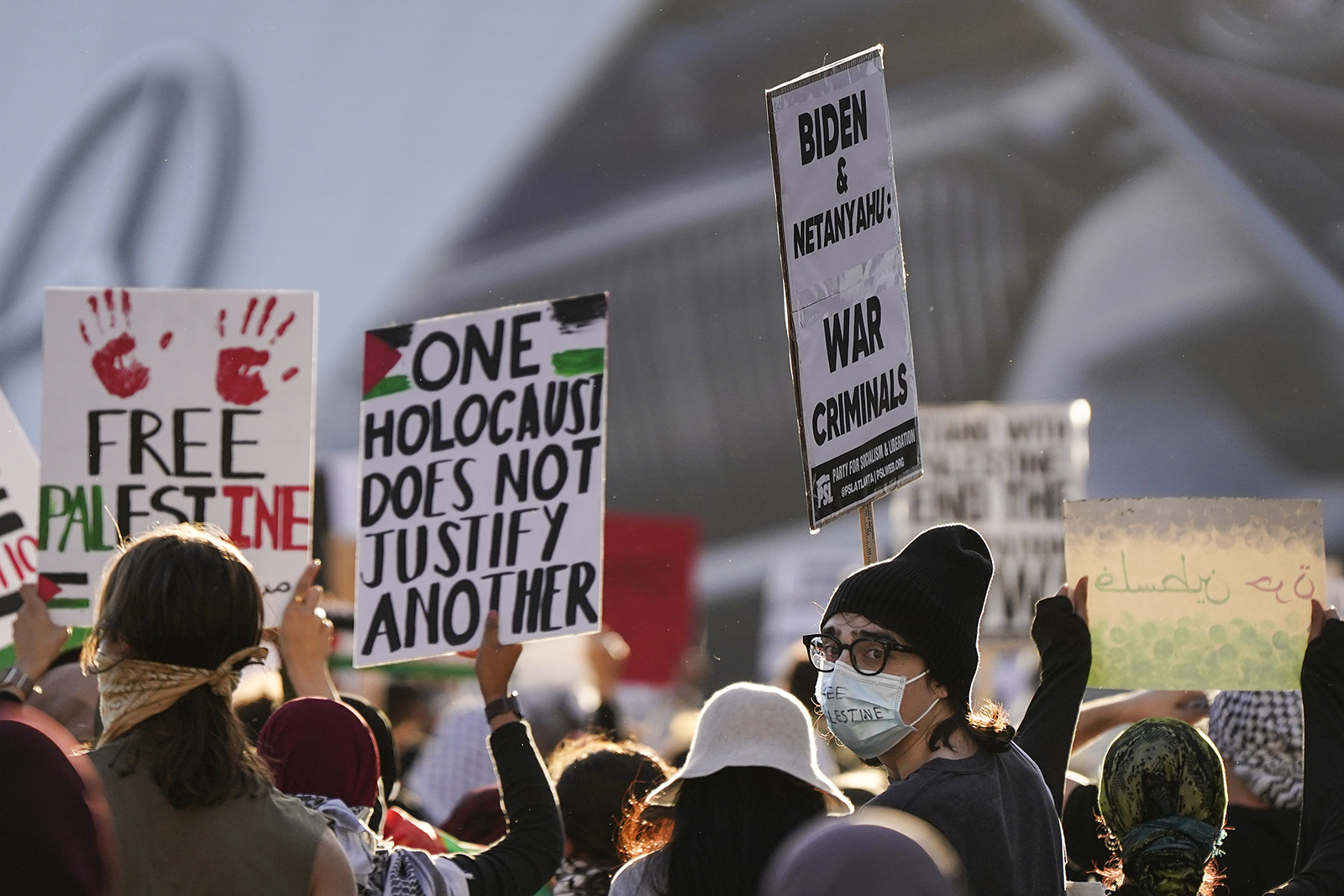
Demonstrators protest the Israel-Hamas war and call for an immediate cease-fire in the conflict as they march in downtown Atlanta, Oct. 20. (AP/Mike Stewart)
It was the moment President Joe Biden questioned the severity of the casualties in Gaza. That was the turning point, said columnist and author Wajahat Ali, when Muslim and Arab American voters soured on Biden.
"I have no notion that the Palestinians are telling the truth about how many people are killed. I'm sure innocents have been killed, and it's the price of waging a war," Biden said in a White House news conference last week. Biden's remarks cast doubt on the numbers provided by the Gaza Health Ministry, which is controlled by Hamas and, as of Sunday (Oct. 29), has reported over 8,000 fatalities, including the killing of over 3,000 children.
"I can tell you without a doubt, for many, they were like, 'I'm done,'" said Ali.
In the days after the news conference, the Gaza Health Ministry released a list identifying nearly 7,000 people it said were killed in Israeli strikes, and Biden began to shift his message, inviting a handful of Muslim, Palestinian and Arab Americans to meet with him. But the damage was done.
Advertisement
"It further erases Palestinian lives even in death," said Ali. "For many (Arab and Muslim Americans) who aren't Palestinian, for them, if this administration can't see what the rest of the world is seeing, the disproportionate violence, and if even in death, Palestinian lives don't matter, then our lives don't matter as well, to this administration."
The feelings of betrayal and grief circulated on social media and on WhatsApp were reflected in recent polls that report a swift and decisive drop in support for Biden among Arab American and Muslim American voters. A new poll from the Arab American Institute, which surveyed 500 Arab American voters between Oct. 23 and Oct. 27, found that support for Biden in the upcoming election had plummeted to 17% (it was 59% in 2020). James Zogby, founder and president of the Arab American Institute, called the results of the poll "shocking" in a Tuesday news conference.
"It is unlike anything I have ever seen before," said Salima Suswell, Pennsylvania executive director for Muslim American civic engagement organization Emgage, in reference to current Muslim American attitudes toward the president. "And it's actually kind of frightening to think about what the alternative could be." She recalled former President Donald Trump's ban on immigrants from Muslim-majority countries, a policy Trump said he would expand if reelected. "As a Black Muslim, it's scary to think we could have someone who would do that in office again."
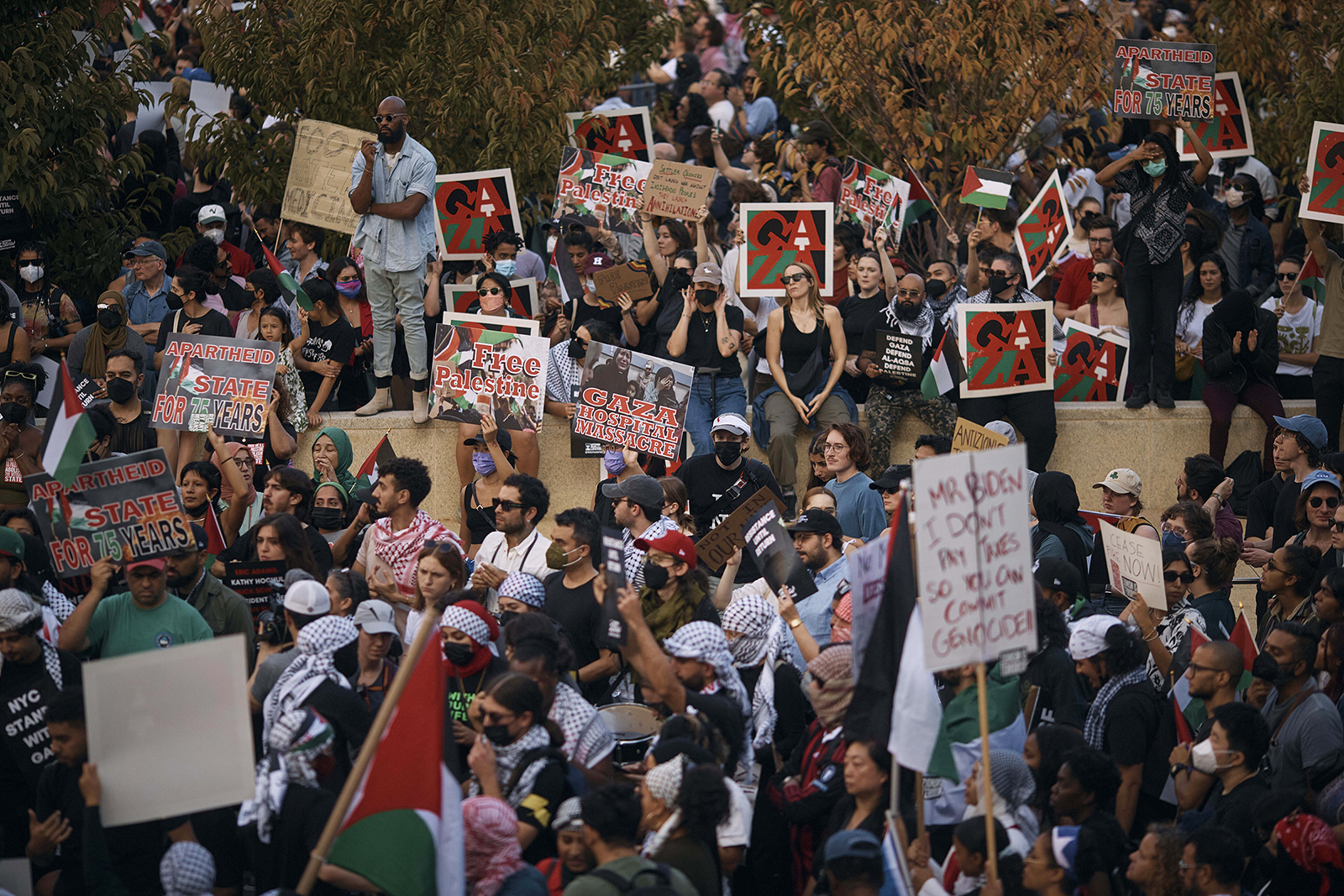
Protesters gather during a pro-Palestine demonstration demanding a cease-fire on Oct. 28 in New York. (AP/Andres Kudacki)
It isn't just support for Biden that has slumped, according to the poll, but identification with the Democratic Party. The poll found that only 23% of Arab American voters now identify as Democrats, down 17 percentage points since April 2023, with 32% identifying as Republican and 31% as Independents. It's the first time in the Arab American Institute's 26-year history that a plurality of Arab American voters didn't align with the Democratic Party.
Zogby attributes the downturn to Biden's statements and actions amid the ongoing war between Israel and Hamas. Sixty-seven percent of Arab American voters reported a negative view of Biden's response to the current crisis, and 68% said the U.S. should call for a cease-fire, per the poll's findings.
Shadin Maali, director of operations for Emgage and a Palestinian American, described a sense of betrayal over Biden's support for Israel's attack on Gaza, as well as America's decision to veto the United Nations resolution for a cease-fire.
"Absolutely, we feel a sense of, we mobilized for you," said Maali. "Now you totally disregard the thousands of votes that were engaged on your behalf."
"Absolutely, we feel a sense of, we mobilized for you. Now you totally disregard the thousands of votes that were engaged on your behalf."
— Shadin Maali
A poll released on Oct. 20 from the firm Cygnal, which had over 2,020 participants (and 150 Muslim participants), also found a drop in support for Biden among Muslim Americans, but not one as drastic as the dip among Arab Americans reported by AAI. Cygnal's poll found that 44.6% of Muslim Americans reported being less supportive of Biden's leadership since the Hamas attacks, a 13-point difference from those who reported being more supportive (31.9%). When asked about their attitude toward Biden, similar numbers reported an unfavorable view (45.8%) as a favorable one (45%).
"I believe it was dropped, but it's difficult to believe it's that much of a drop," said Brent Buchanan, president and founder of Cygnal, about the decrease in Muslim and Arab American support. "We have Joe Biden, a week after the terrorist attack of Hamas on Israel, at almost even — that means the same number of people who say favorable as unfavorable among Muslim Americans."

Salima Suswell (Photo courtesy of Emgage)
While substantive data on current Muslim American and Arab American attitudes toward Biden is limited, anecdotal evidence of a downturn tracks with Biden's sagging approval ratings, which sank 4 points since last month, and 11 points among Democrats, according to a recent Gallup poll. Ali noted that younger people seem especially skeptical of the president, with approval ratings of 35% and 34% among people ages 18-34 and 35-54, respectively, as compared with an approval rating of 42% among those 55 and older.
One year out from the 2024 election, plenty could change before voters take to the polls. But with significant populations of Muslims and Arab Americans in battleground states such as Michigan, Pennsylvania, Arizona and Ohio, experts say Biden can't afford to take the Muslim and Arab American vote for granted.
"In Pennsylvania specifically, Black Muslims were instrumental to Biden's victory in 2020," said Suswell. "But now, I have heard from many Muslims in the African American community that they will not be voting for Biden in 2024 due to his disregard and lack of empathy for Muslims who are suffering in the Middle East."
Muslim and Arab American voters who feel scorned by Biden aren't likely to flock to Trump, according to those interviewed by Religion News Service, but they may feel strongly enough to vote for an independent candidate or to sit out the election altogether. Zogby predicted it would be a "hold your nose election" for many Arab Americans at this point.
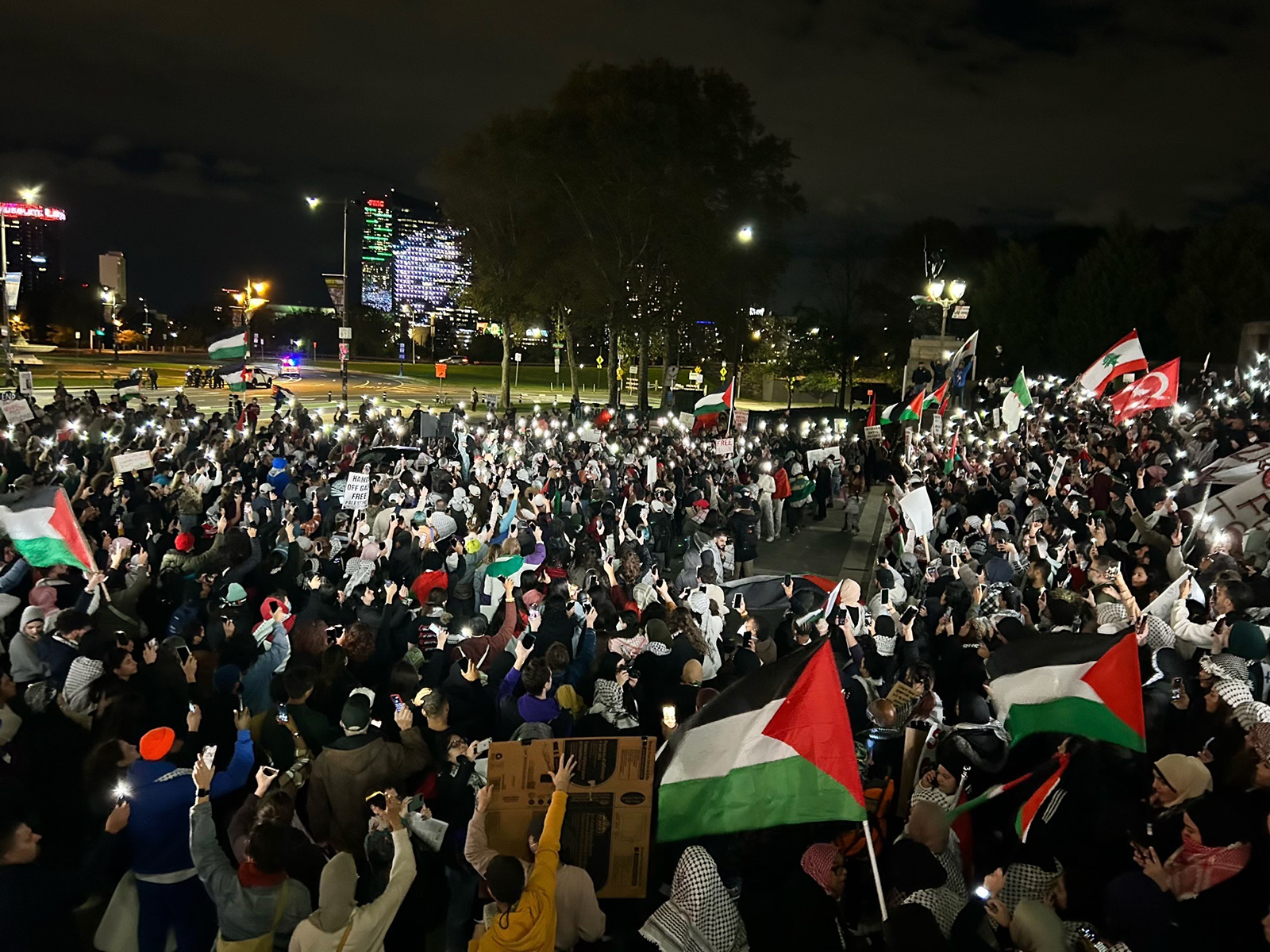
A recent pro-Palestinian demonstration in Philadelphia. (Photo by Asiyah Jones)
While Ali is firm in his convictions that "a vote for Trump, a vote for a third party or sitting out" would be "more disastrous" than a vote for Biden, he also pointed out that Arab Americans and Muslim Americans upset with Biden aren't "irrational or self-destructive."
"They are very aware of how terrible Trump is," said Ali, pointing to Trump's Islamophobic policies. But they also feel that to vote for Biden is "to be party to an administration that's allowing genocide, ethnic cleansing or collective punishment."
In recent days, Biden has been working to regain trust with Muslim and Arab American voters. But in addition to meaningful dialogue with these groups, Maali said the only real way to regain trust is for the administration to push for de-escalation in the region and a political resolution to the crisis, rather than a military one.
Suswell agreed, saying she'd like to see Biden call for a cease-fire.
"In large part, Muslim Americans agree on the sanctity of all human lives, and unequivocal condemnation of violence regardless of faith," she said. "And we call for a cease-fire not only because of the casualties of Muslim and Palestinian lives in Gaza, but also because of all civilians who have been casualties of this humanitarian crisis."
